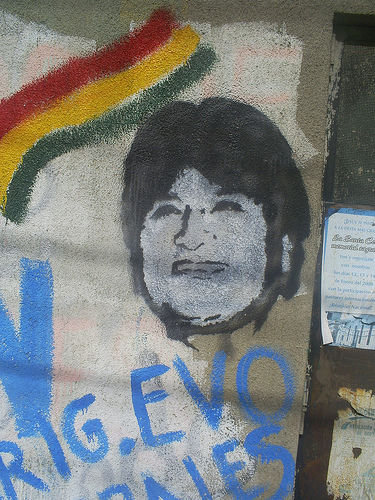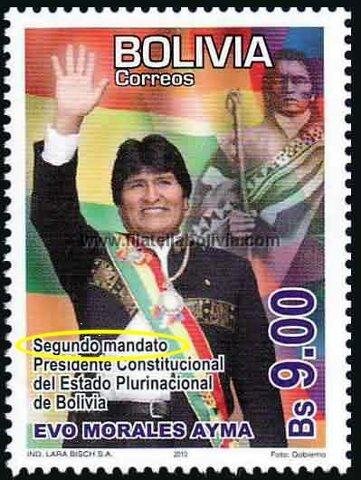Bolivia's ruling party MAS [1] has announced that President Evo Morales will seek re-election in the upcoming presidential contest scheduled for December 2014. Morales, a former coca grower turned unionist and leftist leader, enjoys great support in Bolivia, particularly among the indigenous and rural populations.
But the announcement has sparked a debate over whether his current term counts as his first or second, and whether the country's four-year-old constitution would allow him to run again.
Back in 2005, after years of political instability, Evo Morales was elected president with 54 percent of the votes. His first term began in January 2006, but political conflict continued, mainly between eastern regions and Morales’ leftist government, which promoted a new constitution.
 [2]
[2]Evo Morales image during presidential campaign. Photo by vocesbolivianas on Flickr, under Creative Commons license (CC BY-NC-SA 2.0)
After the ruling party and the opposition reached political agreements in 2008, a referendum was called for January 2009 to approve a new constitution. The president’s term was shortened and new elections took place in December 2009. Evo Morales won for a second consecutive election with 64 percent of the votes.
The 2009 Bolivian Constitution [3] [es] states:
Artículo 168. El periodo de mandato de la Presidenta o del Presidente y de la Vicepresidenta o del Vicepresidente del Estado es de cinco años, y pueden ser reelectas o reelectos de manera continua por una sola vez.
Article 168. The term of office of the President or the Vice President is five years and may be reelected continuously only once.
Further down, the same constitution also mandates:
Los mandatos anteriores a la vigencia de esta Constitución serán tomados en cuenta a los efectos del cómputo de los nuevos periodos de funciones.
Previous mandates to the effective date of this Constitution shall be taken into account for purposes of calculating new terms.
Supporters of Morales’ third candidacy, such as Senator Rene Martinez, consider [4] [es] that the eventual re-election of Morales is constitutional and legitimate.
Martinez argued on his Twitter account (@ReneMartinez_) [5][es]:
@ReneMartinez_ [6]: Disposición Transitoria Primera de la CPE, solo reguló la elecciones del 2009. no tiene mas aplicación en el tiempo.
@ReneMartinez_ [6]: [This] transitory article on the Constitution only regulated the 2009 elections, it is not applicable afterwards.
On the other hand, others claim that this is clearly Morales’ second term and a third candidacy is constitutionally not allowed.
Following that argument, political activist Julio Aliaga (@JulioAliagaL) [7] [es] tweeted a photo of an official post stamp released by Bolivia’s government in 2012 celebrating the second term of president Evo Morales:
 [7]
[7]“Second term. Constitutional President of the Plurinational State of Bolivia.” Image shared on Twitter by user @JulioAliagaL
The case is now under consideration by the Plurinational Constitutional Court of Bolivia.
However, as Mario Duran, a blogger based in El Alto, explained [8] [es], Morales’ supporters still have an alternative if the court rules against allowing him to run again:
para habilitar al presidente Morales a una nueva re-eleccion se requiere un referéndum que apruebe cualquier modificación a la Constitución Política del Estado, ahora considerando el apoyo superior al 50% en votación que posee el Presidente Evo Morales, sus partidarios deberían optar por el referendum.
In order to make President Morales eligible for a new re-election, a referendum is required to approve any amendment to the constitution, considering that President Evo Morales enjoys support from more than 50 percent of the electorate, his supporters should opt for the referendum.
Electoral calculations are under way as the Bolivian electoral machinery could be tested once again in the coming months.